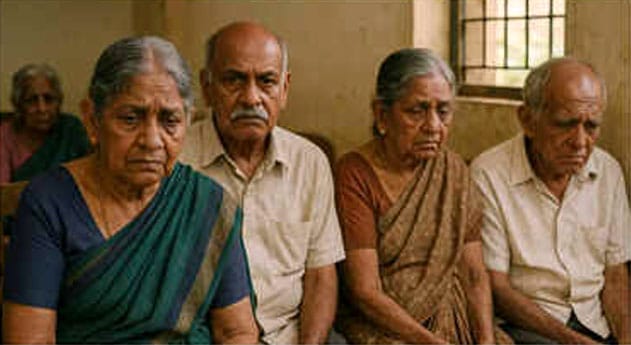✍ Abu Qutub
The quiet lanes of Doddakallasandra, near Bengaluru, recently witnessed a tragedy that should shake the conscience of every one of us. Krishnamurthy, 81, and his wife Radha, 74, chose to end their lives in an old age home where they had spent their final years — away from their son, away from family warmth, and far from the home they had once built together.
This was not just a personal tragedy; it’s a painful reminder of the kind of society we have raised — one where parents spend their lives raising children, only to spend their last days in loneliness!
Vijay, their only son, was no ordinary man. He was educated, financially secure, and a software engineer by profession. Yet, his parents, the very people who sacrificed their all to give him that life, were not welcome in his home. Whether it was family conflict, lifestyle differences, or simply a lack of space in his heart, the fact remains: children today are writing the last chapter of their parents’ lives within the walls of old age homes.
Of course, children may pay hefty annual fees to old age homes to ensure their parents have food, shelter, and medical care. But what price can be placed on loneliness? What medicine can cure the emptiness of a heart longing for its children? What substitute can replace the laughter of grandchildren and the touch of family affection?
Old age homes across India are filled with silent stories like this — of forgotten sacrifices, of unheard voices, of unshared tears. Where did our values vanish? What happened to Maatru Devo Bhava — the idea of revering the mother as divine? What happened to the religious teaching that serving one’s parents is akin to serving God? We may pray, fast, and perform rituals every day, but if we have failed our parents, have we not failed religion itself?
The truth is harsh. According to the HelpAge India survey 2022, 35 percent of elderly people living with families are abused by their own children. This number is more than a statistic; it’s a mirror reflecting how deep our cultural decline has sunk.
We often hear excuses: “My children live abroad,” or “I am busy with my work.” But what parents lose is not just a room in their child’s house. What they lose is the foundation of values they once built into that house. Parents may send their children to best schools, but where do they receive value-based education? In today’s calculations of profit and loss, the greatest casualty has been the value of human relationships.
The family is the pillar of society. And when that pillar cracks, the entire structure collapses. What we need today is not only engineers skilled in technology, but engineers of humanity. Not only toppers in universities, but children who can top the exam of life, where love, respect, and values are the real subjects.
The tragedy of Krishnamurthy and Radha is, in truth, the tragedy of our times. It is a warning bell for all of us.
Religious, educational, and political organisations across the country are filled with young people brimming with passion. But how many of them sit with their parents after returning home? How many who speak of sacrificing their lives for a cause are able to soften their hearts when they see their parents’ silent suffering?
Every faith teaches respect and honour for parents. Islam commands believers not even to say “oof” to their parents. In fact, fasting, prayer, and pilgrimage are incomplete unless one’s parents are satisfied. Hinduism places Pitru Rina, the debt owed to parents, at the very heart of dharma. Christianity, too, insists: “Honour thy father and mother.”
What the elderly truly need is not luxury rooms in an old-age home or the services of private nurses. They need the joy of morning conversations over coffee, the warmth of family celebrations, and the comfort of a child’s presence at night.
This is why change must begin at home. Children must be taught patience and respect for the elderly. Schools must integrate “Respect for the Elderly” into value education. Governments should launch nationwide campaigns to restore dignity to senior citizens. And above all, each one of us must commit, not just in words but in time, to giving our parents what they truly need: our presence.
The road to ultimate success begins at home — with one’s parents. If we fail here, then no amount of rituals, no number of prayers, and no worldly successes can fill the void.




